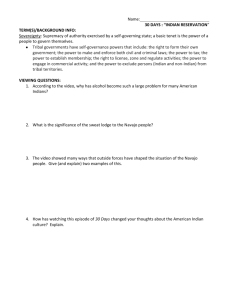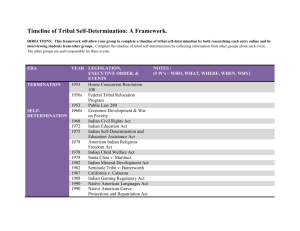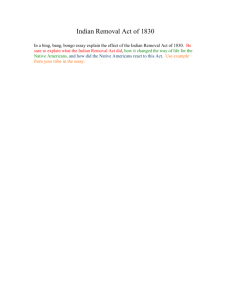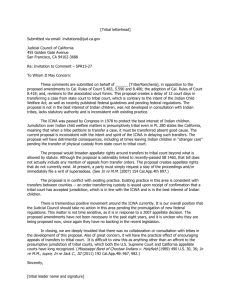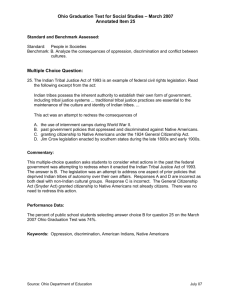The Indian Child Welfare Act
advertisement
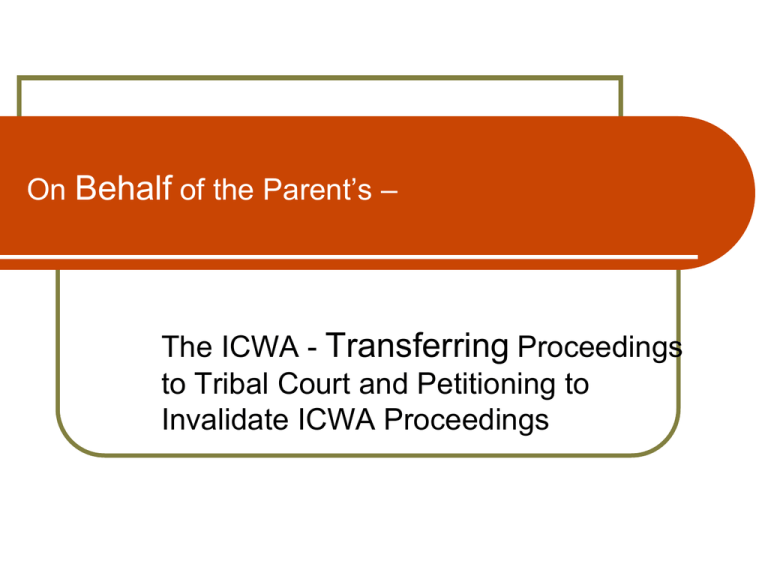
On Behalf of the Parent’s – The ICWA - Transferring Proceedings to Tribal Court and Petitioning to Invalidate ICWA Proceedings The Indian Child Welfare Act – Transferring to Tribal Court §1911. Indian tribe jurisdiction over Indian child custody proceedings The ICWA The Indian Child Welfare Act enacted in 1978 “was the product of rising concern . . . over the consequences for Indian children, Indian families, and Indian tribes of abusive child welfare practices that resulted in the separation of large numbers of Indian children from their families and tribes through adoption or foster care placement, usually in non-Indian homes.” Mississippi Band of Choctaw Indians v. Holyfield, 490 U.S. 30, 32 (1988). Testimony in 1978 25 to 35% of all Indian children separated from their families and placed in adoptive homes, foster care or institutions The adoption rate of Indian children 8 times that of non-Indian children Congress intended the passage of the ICWA to preserves tribal sovereignty with respect to protecting and preserving Indian families and protecting the best interests of Indian children The Holyfield Message The ICWA values the tribe’s role in child custody proceedings impacting tribal children and protects the Tribe’s fundamental interest in retaining tribal children within the Tribe §1911 is the heart of the ICWA – “seeking to protect the rights of the Indian child as an Indian and the rights of the Indian community and tribe in retaining its children in its society” House Reports, at 23, U.S. Code Cong. & Admin.News 1978, at 7546. §1911. Indian tribe jurisdiction over Indian child custody proceedings 1911(a) Exclusive jurisdiction Involving an Indian child who resides or is domiciled within the reservation of such tribe Where an Indian child is a ward of a tribal court 1911(b) Transfer of proceedings; declination by tribal court In any state court proceeding Foster care placement or termination of parental rights To an Indian child not domiciled or living on the reservation In the absence of good cause to the contrary, shall transfer to tribal court Absent objection by either parent Upon petition by parent or Indian child’s tribe Subject to declination by the tribal court Discussing transfers to tribal court •Permanency •Tribal values regarding permanency •Customary adoptions •right to object “veto power” •right to bring transfer motion •Timelines •Case planning •resources Parent’s attorney •Distance •Placement •Services •Witnesses •Representation •Social workers •Guardian ad litems Barriers to Transfer to Tribal Court Tribal Court does not accept the case Objection by other parent “good cause to the contrary” Fact specific – case-by-case determination The court may find good cause to deny transfer if . . . Indian child’s tribe does not have a tribal court Filed at an advanced stage Undue hardship to the parties “Socio-economic conditions and the perceived adequacy of tribal or Bureau of Indian Affairs social services or judicial systems may not be considered in a determination that good cause exists” See Bureau of Indian Affairs Guidelines, 44 Fed. Reg. 67,584,67,595 at C.#(b)(i)(iv), (c), (d)(Nov. 26, 1979) Inherent Sovereignty of Tribes Any consideration of Tribal Court jurisdiction must consider inherent sovereignty of Indian tribes Indian Tribes do not receive the authority to govern and protect their members through any act of Congress nor do they receive if through any State or Federal Court decision A Tribe’s right to govern and protect its members is one of its most fundamental rights Practical considerations for Transfers to Tribal Court – ‘the Minnesota Model’ A “transfer of jurisdiction over Indian child custody matters to tribal authorities is mandated by the Indian child Welfare Act whenever possible.” In re the Matter of the Welfare of B.W., 454 N.W.2d 437, 446 (Minn. Ct. App. 1990). Minnesota Rules of Juvenile Protection Procedure, Rule 48. Transfer to Child’s Tribe Minnesota Transfer Rules Rule 48.01. Transfer of Juvenile Protection Matter to the Tribe Subd. 1 Motion to Request to Transfer, Indian child’s parent, Indian custodian, tribe (a) written (b) on-the-record, oral Subd. 2, Service and Filing Requirements for Motion, Request, or Objection to Transfer Matter to Tribe Subd. 3, Transfer Required Absent Objection by Parent or Good Cause Findings – THE ORDER TRANSFERRING THE JUVENILE PROTECTION MATTER TO THE INDIAN CHILD’S TRIBE SHALL ORDER JURISDICTION OF THE MATTER RETAINED UNTIL THE INDIAN CHILD’S TRIBE EXERCISES JURISDICTION OVER THE MATTER Subd. 4, Objection to Transfer by Parent Subd. 5, Request to Deny Transfer by Child or Party Who is Not a Parent Subd. 6, Hearing on Request to Deny Transfer to Tribal Court Subd. 7, Retention of District Court Jurisdiction until Notice from the Indian Child’s Tribe Rule 48.02 Communication Between District Court and Tribal Court Judges to . . . (1) inquire whether the tribal court will accept the transfer (2) inquire of the child’s tribe what district court orders should be made regarding the child’s safe transition to the jurisdiction of the Indian child’s tribe How . . . In writing, by telephone or electronic means Parties may be allowed to participate including a hearing or telephone A record shall be made of communication – Court shall promptly notify parties did not participate and grant access to the record Communication between courts on administrative matters may occur without informing the parties and a record need not be made Rule 48.03, Upon receiving an order transferring a juvenile protection matter to tribal court, the court administrator shall file the order and serve it on all parties . . . The court administrator shall forward a certified copy of the complete court file by U.S. Mail, courier, hand-delivery, or any other means to ensure timely receipt of the file by the tribal court. “Whatever feelings we might have as to where the twins should live; however, it is not for us to decide that question. . . Rather, we must defer to the experience, wisdom, and compassion of the [Choctaw] tribal courts to fashion an appropriate remedy.” Mississippi Band of Choctaw Indians v. Holyfield, 490 U.S. 30, 32 (1988). Petitions to Invalidate §1914.Petition to court of competent jurisdiction to invalidate action upon showing of certain violations Any Indian child who is the subject of any action for foster care placement or termination of parental rights under state law, any parent or Indian custodian from whose custody such child was removed, and the Indian child’s tribe may petition any court of competent jurisdiction to invalidate such action upon a showing that such action violated any provisions of sections 1911, 1912 and 1913 §1911, Indian tribe jurisdiction over Indian child custody proceedings §1912, pending court proceedings (a) notice (b) appointment of counsel (c) examination of reports (d) active efforts (e) foster care, qualified expert witness (f) termination of parental rights, qualified expert witness, beyond a reasonable doubt §1913, Parental rights; voluntary termination Consent in writing and before a judge 10 days after birth Withdrawal of consent anytime prior to final decree or termination or adoption “Had the mandates of the ICWA been followed in [1986], of course, much potential anguish might have been avoided, and in any case the law cannot be applied so as automatically to “reward those who obtain custody, whether lawfully or otherwise, and maintain during any ensuing (and protracted) litigation.” Mississippi Band of Choctaw Indians v. Holyfield, 490 U.S. 30, 54 (1988).
